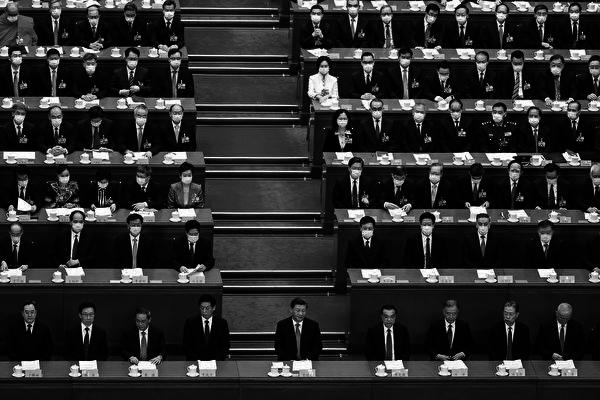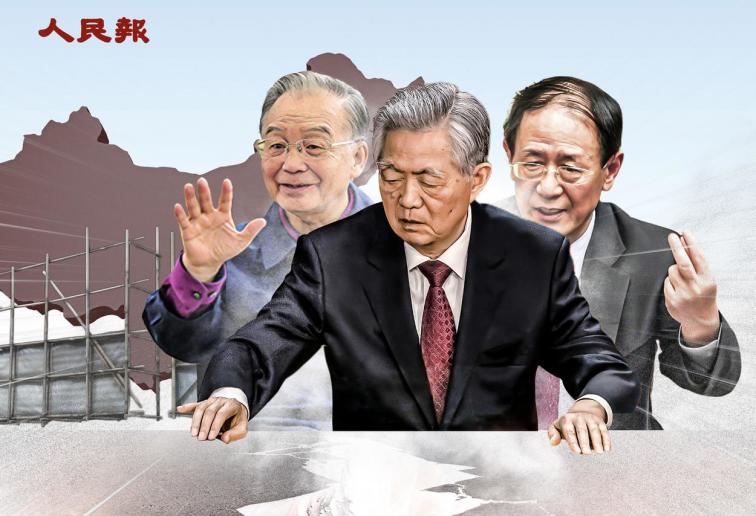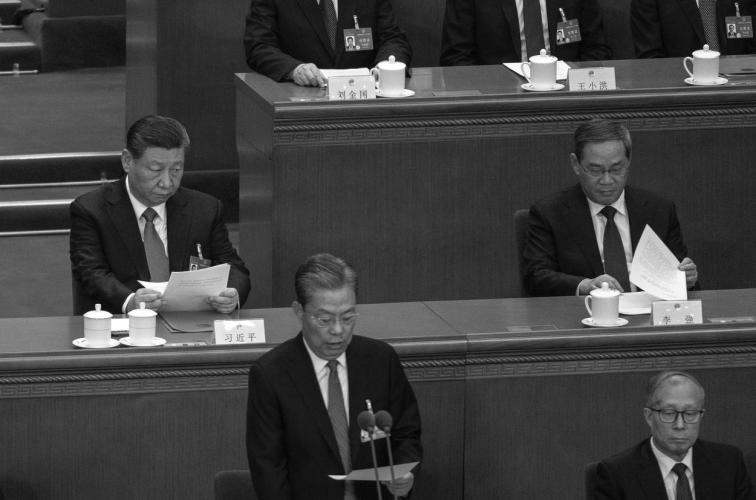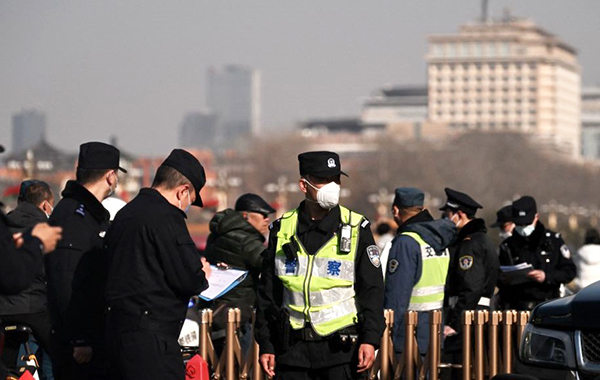March 11, 2023: Senior members of the CCP’s Central Military Commission line up to take the oath at the National People’s Congress. From right to left: Zhang Youxia, He Weidong, Li Shangfu, Liu Zhenli, Miao Hua, Zhang Shengmin. (Lintao Zhang/Getty Images)
[People News] The Fourth Plenary Session of the Chinese Communist Party (CCP), which should have been held before the Central Commission for Discipline Inspection’s plenary session in late October last year, has been delayed, with no news to date. On July 15, independent political commentator Cai Shenkun posted on X (formerly Twitter) six major topics allegedly set for the upcoming session. However, these topics differ from prior expectations of significant personnel changes, instead suggesting substantial shifts in the CCP’s political direction.
The six major topics released by Cai Shenkun are:
-
For the first time, all levels of party committees and governments are instructed to uphold “Three Loyalties”: loyalty to the motherland, loyalty to the people, and loyalty to Mao Zedong Thought.
-
For the first time, a review of the successes and failures of the reform and opening-up policy is proposed, with the aim of reforming all elements that hinder the interests of the people or social progress.
-
For the first time, a return to a dictatorship of the proletariat led by the working class and based on the worker-peasant alliance is proposed, along with the reinstatement of the death penalty for corrupt officials, reinforcing the concept of wholehearted service to the people.
-
For the first time, the path to common prosperity is emphasised over the previously upheld policy of “letting some people get rich first.” This includes addressing the “four hardships”: housing, healthcare, education, and elderly care.
-
For the first time, the unwavering promotion of social fairness and justice is proposed, ensuring that the people truly enjoy broad rights, freedom, the right to speak, and the right to make suggestions, putting “people as masters” into practice.
-
For the first time, a call is made to improve and innovate the socialist system, seeking a theoretical direction for the development of China's socialist model.
Dr. Zhang Tianliang, a professor at Fei Tian College, analysed these six points on his YouTube program Tianliang’s Argument.
He said the first topic doesn’t even mention the Party anymore — previously, it was about loyalty to the Party, but now it calls for loyalty to Mao Zedong Thought. This could signal the return of the Cultural Revolution.
Zhang believes this marks a major ideological regression by the CCP, where the party itself is no longer central, and only the supreme leader remains. The emphasis on loyalty to Mao is, in reality, loyalty to Xi Jinping, as Xi sees himself as the spiritual successor to Mao.
Regarding the second topic, Zhang explains that reviewing the reform and opening-up is essentially a repudiation of Deng Xiaoping. Xi Jinping has always believed that Deng’s reforms weakened the Party’s control, so this may signal a reversal of many of Deng’s key policies. Zhang predicts a coming clash between Xi and the Party’s technocrats and princelings who support reform and openness.
For the third topic, Zhang notes that restoring the death penalty for corrupt officials was part of Mao’s strategy. Xi likely believes that without the death penalty, it’s impossible to deter corruption or demonstrate his power over life and death. He suggests this is a strategy for Xi to accuse political enemies of corruption and eliminate them.
The fourth topic — promoting common prosperity — was a Mao-era ideal, but with low standards and poor quality. Many people today who can’t afford food, education, or healthcare nostalgically look back at Mao. Xi may be trying to appeal to this demographic to prevent widespread unrest in cities or rural areas — a strategy to stabilize society.
Regarding the fifth topic, Zhang argues it’s essentially a revival of Mao’s mass campaigns — big-character posters, debates, and public forums, which in practice are unlikely to be implemented genuinely. Instead, Xi may use them to mobilise the masses against his political enemies.
As for the sixth topic — innovating the socialist system — Zhang believes this is part of Xi’s effort to mythologise himself and develop a new ideological system bearing his name.
Cai Shenkun also analyzed that these six topics point to continued political tightening under the CCP, though there might be some economic loosening. Mao Zedong Thought may be formally included in the plenary session communiqué. He warned that if the CCP raises the banner of Mao Zedong Thought once more, it could mean the return of the Cultural Revolution is not far off.
Cai had earlier received information suggesting the 4th Plenary Session would be held from August 27 to 30. However, since there has been no official announcement by mid-July, it's highly likely the meeting will be postponed.
Why the delay?
Cai explained that from July to early August is typically the period of the Beidaihe meeting. This year's Fourth Plenary Session is particularly unusual — Xi Jinping intends to present his key resolutions to senior Party veterans, consult democratic parties, and seek feedback, possibly during informal "working meetings" at the Beidaihe resort. Following that, there will be the September 3rd military parade, and shortly after, important meetings with Russia. Clearly, there is a scheduling conflict if the plenary is planned for late August.
Moreover, in the past, plenary sessions were usually announced two months in advance. If the meeting is to be held in October, it should be officially announced in August. The delay may be due to unresolved debate over the agenda or ongoing power struggles, thus pushing the meeting back further.
Cai suggests that the issue may go beyond just the difficulty of convening the session. The release of the six topics now may be a “trial balloon” to gauge public and elite reaction.
Currently, the authenticity of these six topics cannot be confirmed. Observers believe that regardless of their truth, any change or adjustment to CCP policy ultimately serves one purpose: to preserve its one-party dictatorship.
(First published by People News)











News magazine bootstrap themes!
I like this themes, fast loading and look profesional
Thank you Carlos!
You're welcome!
Please support me with give positive rating!
Yes Sure!